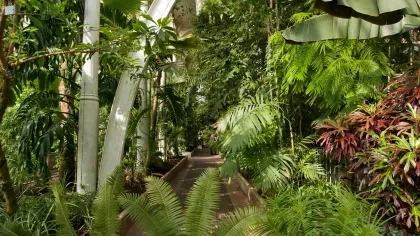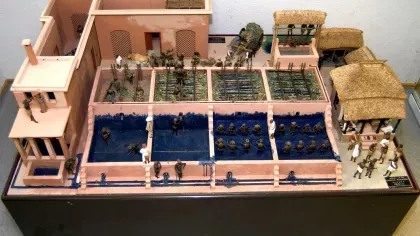12 March 2021
Rethinking and revealing the complex and fascinating stories of Kew
Richard Deverell, Director of the Royal Botanic Gardens, Kew, shares our commitment to sharing the economic and historic backgrounds of the plants in our collections.

Over the last fortnight, we launched our ambitious ten-year strategy, Our manifesto for change, and released the final episode in our Unearthed podcast series which examines the hidden legacy of inequality in botany and horticulture. In both we have set out plans for a more inclusive Royal Botanic Gardens, Kew.
In speaking on this topic, we have attracted some lively discussions in the press and on social media. Some people have told us that they are excited to see the stories of their heritage represented at Kew, others have told us they are concerned that we are re-writing the history of a much-loved landmark.
A fundamental purpose of a botanic garden is to explain the importance of plants to our visitors. All life, including humanity, depends on plants. They are our essential food, our life-saving medicines and our valuable materials – and in turn they are embedded in all of our histories, cultures and societies.
The stories we share must cover the economic and historic backgrounds of the plants in our collection. Sugar cane, for example, has an immensely complex and fascinating history – a story that paints a vivid picture of the British empire and the slave trade. I see it as a huge privilege that we can tell these stories through living plants rather than historic artefacts in a museum.
It is widely agreed amongst our staff, volunteers and trustees that our information panels at Kew have not done these complex stories full justice.
They need re-thinking and enriching, and given the important conversations we are having as a society around inclusivity, now is the time to do so.
This is predominantly an exercise in revealing and restoring stories that have so far been untold, adding to information and bringing more diverse perspectives. We want to broaden and enhance our narrative, not detract from it or to censor. There is always something new to learn.
But this is not simply about our interpretation panels – that is one small part of it.
Making Kew relevant and welcoming to everyone is an important theme in Our manifesto for change, our new 10-year strategy. Our Executive Board and Trustees have made a long-term commitment to improve in this area, and there is much we need to do.
RBG Kew is a public body and partly reliant upon income from the taxpayer. It is essential that we are for everyone; and that everyone feels there are things at Kew that are relevant to their lives and that they feel welcomed in our gardens.
The work we plan to carry out will be gradual, meaningful and sustainable. Organisation-wide working groups have been tasked with examining in great detail how we practise our science, share our collections, acknowledge our history and heritage, consider our choice of language, recruit and develop our staff, and curate our public programmes.
The initial thinking behind our podcast episode was to acknowledge the widespread social injustices, both historical and contemporary, that were brought into sharp focus by the death of George Floyd last year.
We felt it was a pertinent moment to examine the contemporary framework that creates barriers to horticulture and botany (and subsequently to Kew), for so many today. For example, I believe we need more horticultural role models from a wide range of backgrounds and ethnicities, particularly in senior posts at Kew.
The podcast features voices from both inside and outside Kew, who share their expert and genuine experience of inequality in botany and horticulture.
I encourage you to listen to it. Both directly and indirectly, it has triggered a significant conversation about how we tell the story of our history to our visitors.



